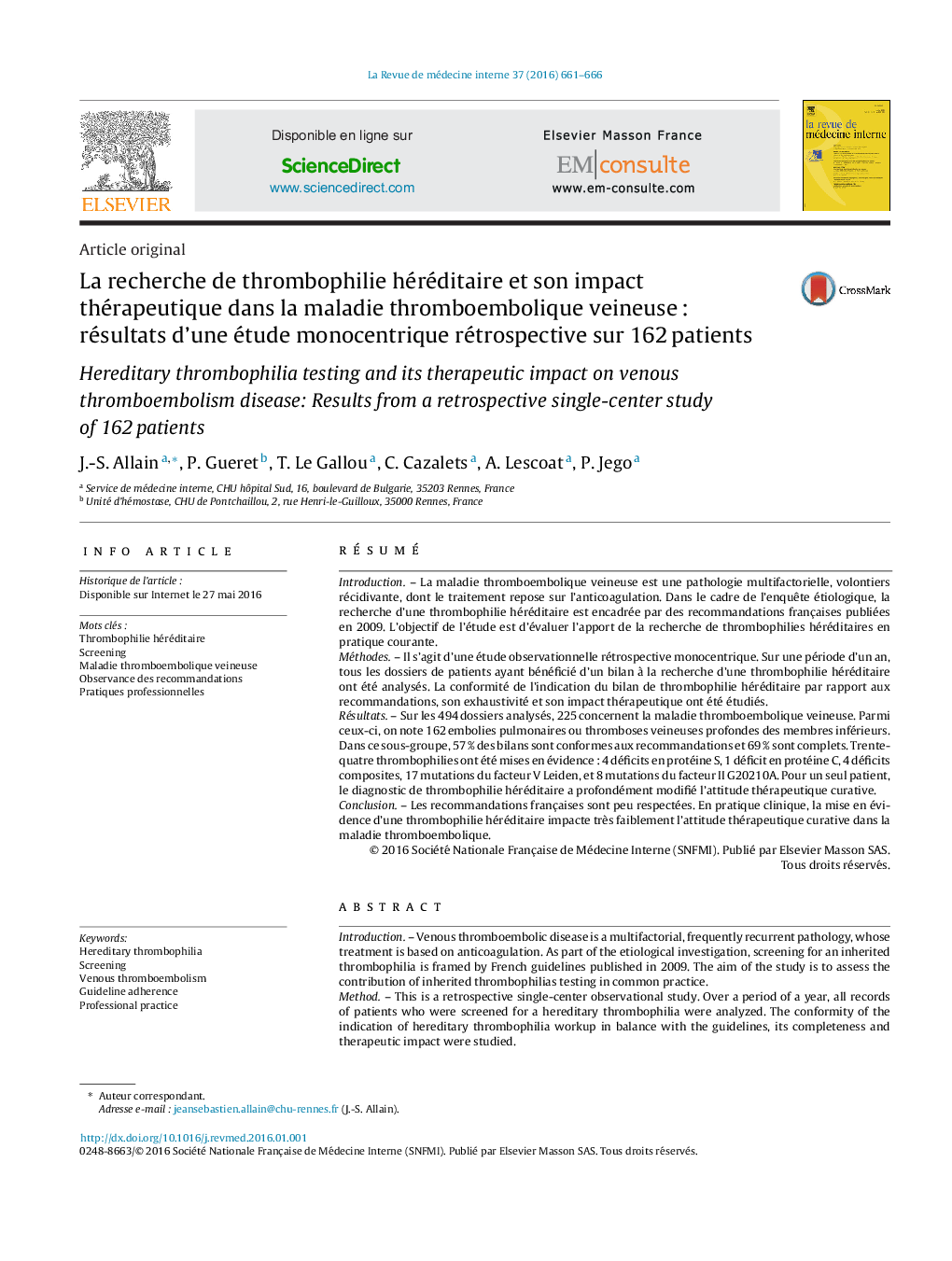| کد مقاله | کد نشریه | سال انتشار | مقاله انگلیسی | نسخه تمام متن |
|---|---|---|---|---|
| 5620995 | 1406124 | 2016 | 6 صفحه PDF | دانلود رایگان |

RésuméIntroductionLa maladie thromboembolique veineuse est une pathologie multifactorielle, volontiers récidivante, dont le traitement repose sur l'anticoagulation. Dans le cadre de l'enquête étiologique, la recherche d'une thrombophilie héréditaire est encadrée par des recommandations françaises publiées en 2009. L'objectif de l'étude est d'évaluer l'apport de la recherche de thrombophilies héréditaires en pratique courante.MéthodesIl s'agit d'une étude observationnelle rétrospective monocentrique. Sur une période d'un an, tous les dossiers de patients ayant bénéficié d'un bilan à la recherche d'une thrombophilie héréditaire ont été analysés. La conformité de l'indication du bilan de thrombophilie héréditaire par rapport aux recommandations, son exhaustivité et son impact thérapeutique ont été étudiés.RésultatsSur les 494 dossiers analysés, 225 concernent la maladie thromboembolique veineuse. Parmi ceux-ci, on note 162 embolies pulmonaires ou thromboses veineuses profondes des membres inférieurs. Dans ce sous-groupe, 57 % des bilans sont conformes aux recommandations et 69 % sont complets. Trente-quatre thrombophilies ont été mises en évidence : 4 déficits en protéine S, 1 déficit en protéine C, 4 déficits composites, 17 mutations du facteur V Leiden, et 8 mutations du facteur II G20210A. Pour un seul patient, le diagnostic de thrombophilie héréditaire a profondément modifié l'attitude thérapeutique curative.ConclusionLes recommandations françaises sont peu respectées. En pratique clinique, la mise en évidence d'une thrombophilie héréditaire impacte très faiblement l'attitude thérapeutique curative dans la maladie thromboembolique.
IntroductionVenous thromboembolic disease is a multifactorial, frequently recurrent pathology, whose treatment is based on anticoagulation. As part of the etiological investigation, screening for an inherited thrombophilia is framed by French guidelines published in 2009. The aim of the study is to assess the contribution of inherited thrombophilias testing in common practice.MethodThis is a retrospective single-center observational study. Over a period of a year, all records of patients who were screened for a hereditary thrombophilia were analyzed. The conformity of the indication of hereditary thrombophilia workup in balance with the guidelines, its completeness and therapeutic impact were studied.ResultsOf the 494 records analyzed, 225 were related to venous thromboembolism. Among them, there were 162 pulmonary embolisms or deep vein thrombosis of the lower limbs. In this subgroup, 57 % of records complied with guidelines and 69 % were complete. Thirty-four thrombophilias were highlighted: 4 protein S deficiencies, 1 protein C deficiency, 4 combined deficiencies, 17 factor V Leiden mutations and 8 factor II G20210A mutations. For one patient, hereditary thrombophilia diagnosis had profoundly changed the curative therapeutic approach.ConclusionAdherence to French guidelines remains limited. In clinical practice, diagnosis of hereditary thrombophilia has little impact on the curative therapeutic approach in venous thromboembolic disease.
Journal: La Revue de Médecine Interne - Volume 37, Issue 10, October 2016, Pages 661-666